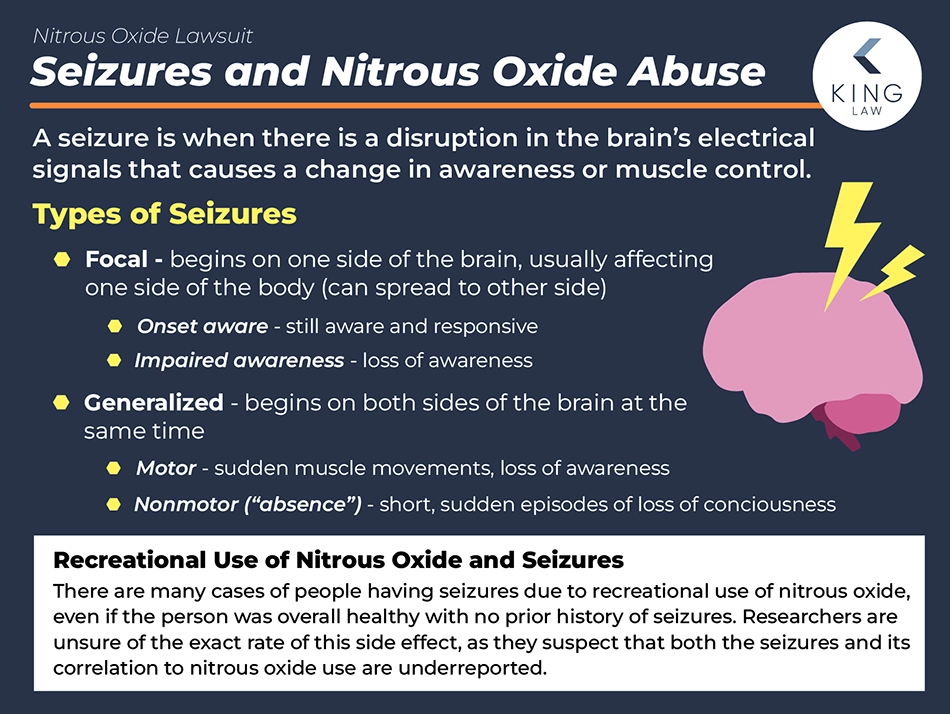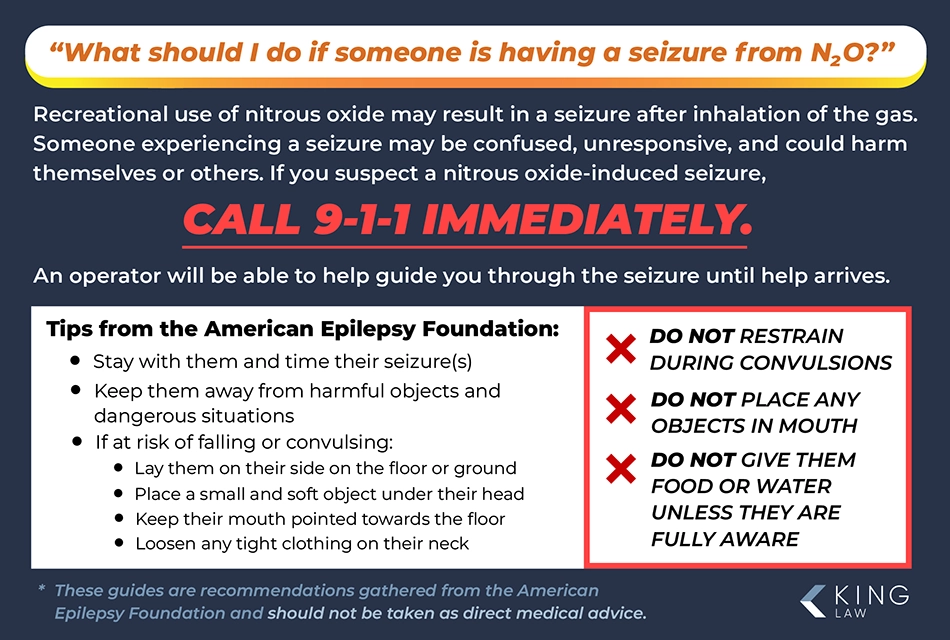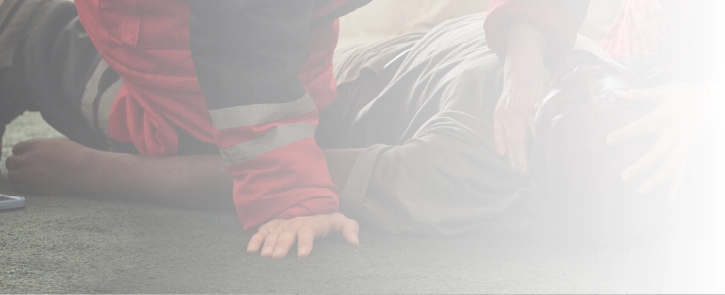Complete the form below to see if you qualify for a Whip-It Lawsuit

Using nitrous oxide recreationally (to get high) can cause serious adverse effects like seizures, brain injuries, and nerve damage. As the overall number of people who use N2O rises, some health care professionals believe nitrous oxide-induced seizures will become more common.
In this article, you will learn about how nitrous oxide (also called whippets, Galaxy Gas, nangs, N2O, NOS, and hippy crack) can cause seizures and what symptoms to look out for. This page also discusses the risk factors that can increase someone’s chances of seizures after huffing. The article also describes several cases where casual nitrous oxide users had seizures. Finally, this page walks you through your legal options if you used nitrous oxide and experienced this known side effect.
About the Nitrous Oxide and Seizures
About Nitrous Oxide and Seizures
How Does Inhaling Nitrous Oxide Cause Seizures
Signs and Symptoms of Nitrous Oxide-Induced Seizure
Who’s Most at Risk for Seizures from Nitrous Oxide
Documented Cases of Seizures Linked to Nitrous Oxide Use
Nitrous Oxide Seizure Risk and Statistics
How to Reduce the Risk of Seizures if Using Nitrous Oxide
Have You Experienced Seizures Due to Inhaling Nitrous Oxide
About Nitrous Oxide and Seizures
When people use nitrous oxide in recreational settings, it can cause them to have seizures even if they do not have epilepsy or a history of seizures. That is because nitrous oxide has several negative impacts on the brain. For example, nitrous oxide prevents the person from getting the oxygen or vitamin B-12 their brain needs to function properly. Without these nutrients, the brain is more likely to have issues sending electrical signals, which can lead to a seizure.
Inhaling high doses or concentrations of nitrous oxide can increase someone’s chances of having a seizure, especially if someone inhales gas right from the canister, charger, or tank. Using nitrous oxide daily can also raise someone’s seizure risk.
Nitrous oxide administered by a medical professional carries a low risk of seizures and other negative side effects. Nitrous oxide is a type of anesthesia that dentists give patients to make them more comfortable and lower their pain levels during some procedures. Nitrous oxide is (usually) safe for dentists to use for patients with epilepsy; however, sometimes nitrous oxide can increase the likelihood that someone with epilepsy will have a seizure.

How Does Inhaling Nitrous Oxide Cause Seizures
Nitrous oxide can cause seizures because of the changes it makes in how your body and brain function. For example, using N2O can lower vitamin B-12 in your body, raise homocysteine (an important amino acid) levels, and keep your body from getting enough oxygen. All of these things can heighten the chances of you having a seizure. Seizures can be especially common in people who have nitrous oxide poisoning or who have overdosed on the drug.
Oxygen Deprivation (Hypoxia)
Nitrous oxide takes the place of oxygen in the lungs, which is why dentists combine nitrous oxide with oxygen when they give it to patients in their offices. When you use N2O on your own, you do not know how much oxygen your lungs are getting or the concentration of the nitrous oxide you are inhaling. Most chargers and canisters sold at shops are pure N2O, which is a much higher concentration than health professionals typically administer.
If your lungs cannot send enough oxygen to your brain, it can lead to a seizure because your brain is starving for air. Unfortunately, you may not feel out of breath even if the nitrous oxide is not giving you enough air. So, you may feel normal or only mild N2O side effects right before you lose consciousness. For this reason, inhaling nitrous oxide right from the can or in an enclosed room can be very dangerous.
Vitamin B-12 Deficiency
Nitrous oxide interferes with how your body uses vitamin B-12, which is an important nutrient that your brain and nerves need to send and receive messages. Without vitamin B-12, the signals your brain and nerves send may short-circuit, go to the wrong places, or not work at all. This can cause you to experience seizures and uncontrollable muscle movements, as well as lose the ability to feel or move parts of your body. Sometimes, these problems get better if the person gets timely vitamin B-12 treatments from their doctor. However, some patients never recover full functionality after a severe vitamin B-12 loss.
Elevated Homocysteine Levels
Homocysteine is an amino acid that your body uses to make proteins. Vitamin B-12 is one of the substances that your body needs to break down homocysteine into something it can use to make proteins. Since nitrous oxide prevents your body from using vitamin B-12, not having enough of the vitamin can prevent your body from properly breaking down homocysteine. Because of this, you can have too much homocysteine in your system, which can lead to seizures, heart attacks, blood clots, and strokes. Having more homocysteine in your body than you should can also make anti-seizure medications less effective, which increases your seizure risk if you take these medications.
N₂O Inhalation Causing Barotrauma
Breathing in nitrous oxide from the canister can injure your lungs because of the sudden pressure changes. Nitrous oxide gas is in a pressurized state when it is in a metal tank. When it is released into your lungs, the sudden, sharp pressure change can harm the delicate lung tissue, which can lead to one or both of your lungs collapsing. If your lungs are not working properly, they cannot deliver oxygen to the brain. Without oxygen to feed it, your brain may not work correctly, which can lead to a seizure. Even young and healthy people have had seizures because their lungs collapsed after they inhaled nitrous oxide recreationally.
Mixing Nitrous with Other Substances
Someone’s seizure risk also increases if they use nitrous oxide and other recreational drugs at the same time. Some of the drugs that can worsen the negative side effects of nitrous oxide include alcohol, pain pills, marijuana, and ketamine. Each of these substances changes how your body and brain work and how they process (metabolize) different chemicals. Oftentimes, these changes can be harmful to your brain and may result in seizures, loss of consciousness, or other adverse effects, including psychosis.
Underlying Conditions or Genetic Susceptibility
Seizures are also more likely if the person who is inhaling nitrous oxide has other medical conditions. For example, someone who already has a vitamin B-12 deficiency or has a history of B-12 loss would probably have a higher chance of seizures or nerve damage if they use nitrous oxide. Likewise, someone with a heart condition, nerve disorder, or genetic condition (like a MTHFR gene mutation) has a raised risk of seizures induced by nitrous oxide. For these vulnerable populations, even a low dose or occasional use of nitrous oxide can cause significant, potentially life-threatening problems.
Signs and Symptoms of Nitrous Oxide-Induced Seizure
Someone who is experiencing a seizure because they huffed nitrous or whippets may show the following symptoms:
- Spacing out and being unable to talk (may indicate an aura or partial seizure)
- The person’s eyes flutter, close, or roll back (only the whites of their eyes are showing)
- Sudden collapse and uncontrollable muscle movements
- Foaming at the mouth
- Groaning or grunting
- Hyperactive or hyporeactive responses to touch (like exaggerated reflexes or not responding at all to stimuli)
- Weakness or numbness
- The body becomes rigid and even bent in strange positions (like an overly arched back)
- Amnesia of (forgetting) the episode
Sometimes, people will have an aura or warning signs before they have a seizure; however, this is not always the case. Moreover, if someone has not had a seizure before, they may not know that they are experiencing an aura. Warning signs that a seizure is coming may include sudden changes in how the person looks, acts, or talks. For example, they may slur their words, talk in ways that do not make sense, or they may stop responding at all. Or, the person may notice lights are brighter or dimmer, or sounds are clearer or muffled. Many of these warning signs are side effects of nitrous oxide use, making it somewhat difficult to predict an oncoming seizure.
Seizures are an emergency sign, and the person should be seen by a doctor right away. Their doctor should know that the person used nitrous oxide, because this will help the team develop an appropriate treatment. Nitrous oxide can make it harder for antiseizure medications to work. If the person’s doctor does not know they use nitrous oxide, they may prescribe them medication that may not work. Uncontrolled seizures can cause permanent brain damage.
Who’s Most at Risk for Seizures from Nitrous Oxide
Anyone who uses nitrous oxide recreationally could experience brain damage and seizures. Here are some of the common risk factors for seizures from nitrous oxide:
- Using high concentrations or dosages of nitrous oxide
- Using N2O daily or multiple times per week
- Having epilepsy or a history of seizures
- Having a vitamin B-12 deficiency (common among vegans, vegetarians, and people with anemia)
- Taking other drugs or drinking alcohol while also huffing NOS
- Being diagnosed with a heart condition or a genetic disorder (like MTHFR mutation)
- Huffing nitrous oxide right from the canister, while wearing a mask, or while in a closed space
The more of the above risk factors that someone has, the greater the chance they will experience seizures or nerve or brain issues when using nitrous oxide. Someone may have a seizure or serious side effect even if it is their first time using nitrous oxide or they are taking what they believe is a low dose.
Documented Cases of Seizures Linked to Nitrous Oxide Use
Many people who use nitrous oxide recreationally have experienced seizures, even if they are young, in good shape, and do not have a history of seizures or epilepsy. For example, a 25-year-old man in Sweden had a seizure after he drank alcohol and inhaled nitrous oxide four times in one night. The nitrous oxide also caused his lungs to collapse, which made it extremely painful for him to breathe.
Several case reports have also shown that patients who have a history of heart problems, strokes, or blood clots have had seizures after using nitrous oxide recreationally. Some of these patients were young and developed these medical conditions because of their nitrous oxide addiction, which increased their seizure risk. For example, a 19-year-old woman had blood clots because of a vitamin B-12 deficiency from heavy nitrous oxide use. The combination of nitrous oxide and the underlying medical issues it caused resulted in her having a seizure.
Nitrous Oxide Seizure Risk and Statistics
Researchers are still learning about how common it is for people who inhale nitrous oxide recreationally to have seizures. In 2016 through 2018, the UK reported at least 202 known cases of seizures after using nitrous oxide. However, the true rate is not fully known, because not everyone who has a seizure will go to the doctor or tell their doctor that nitrous oxide abuse may be to blame.
Even so, nitrous oxide use is on the rise at a startling pace. From 2019 to 2024, for example, Michigan’s Poison Control reported a 533 percent increase in N2O poisoning calls. Likewise, the Michigan emergency departments noted a 553 percent increase in nitrous oxide-related service calls. Visits to the ER in Michigan because of nitrous oxide use rose by 757 percent from 2019 to 2023. The UK has passed several laws to help curb the rates of nitrous oxide abuse, as have many states (including Michigan) in the United States.

How to Reduce the Risk of Seizures if Using Nitrous Oxide
There are steps you can take to help lower your risk of having a seizure after using nitrous oxide. The first is not to use nitrous oxide recreationally. If you need help curbing your nitrous oxide use, consider reaching out to a medical professional, an addiction center, or therapist. They can give you a judgment-free space for you to talk about your relationship with N2O and how it impacts your life.
Here are some tips for harm reduction while using nitrous oxide:
- Only use N2O while under the care of a dentist or doctor
- Do not huff nitrous oxide straight from a can
- Use nitrous oxide in a well-ventilated room, like a large room with the windows open
- Do not use nitrous oxide if you have underlying medical conditions
- Do not use nitrous oxide and other drugs or alcohol at the same time
- Only use nitrous oxide in extremely low doses and limit it to occasional use
- Have your vitamin B-12 levels tested
If you are using nitrous oxide and are worried about your seizure risk, talk to your medical team. Stopping your nitrous oxide use provides the best protection against N2O-induced brain damage or seizures. In the meantime, your doctor and a therapist can help you develop coping strategies to help protect you while you prepare to recover.
Have You Experienced Seizures Due to Inhaling Nitrous Oxide
If you had a seizure after using nitrous oxide recreationally, you may have a legal claim against the companies that made and sold you the whipped cream chargers. Multiple lawsuits allege that nitrous oxide companies were dishonest and negligent in how they marketed, distributed, and sold their products. Many people believe that the companies were wrong to sell nitrous oxide at smoke shops and use marketing strategies that pushed N2O as a safe and fun party drug.
King Law is providing free case reviews to people who suffered injuries after using nitrous oxide recreationally. If you used nitrous oxide and had a seizure, we may be able to support you through a nitrous oxide lawsuit. You may be eligible for compensation to pay for your medical bills and other losses.
Contact a Nitrous Oxide Lawyer Today
If you experienced neurological harm (like seizures) after using nitrous oxide, contact our legal team today. We welcome the chance to discuss your concerns and how our nitrous oxide lawyers may be able to help you. Our lawyers have years of hard-won experience fighting for consumers when big companies cut corners and hurt the public.
Call us today by dialing (585) 496-2648. It costs you nothing but your time to meet with us, and we do not charge any upfront legal fees if you hire us. Our intake specialists are standing by to take your call or respond to your online contact form.

